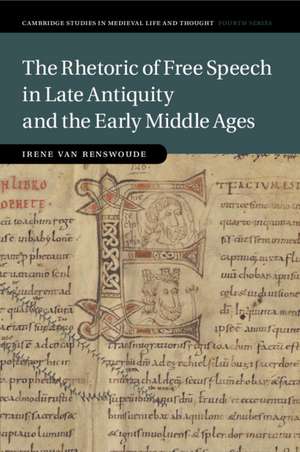The Rhetoric of Free Speech in Late Antiquity and the Early Middle Ages: Cambridge Studies in Medieval Life and Thought: Fourth Series, cartea 115
Autor Irene van Renswoudeen Limba Engleză Paperback – 2 iun 2021
| Toate formatele și edițiile | Preț | Express |
|---|---|---|
| Paperback (1) | 285.16 lei 6-8 săpt. | |
| Cambridge University Press – 2 iun 2021 | 285.16 lei 6-8 săpt. | |
| Hardback (1) | 693.36 lei 6-8 săpt. | |
| Cambridge University Press – 25 sep 2019 | 693.36 lei 6-8 săpt. |
Din seria Cambridge Studies in Medieval Life and Thought: Fourth Series
-
 Preț: 285.93 lei
Preț: 285.93 lei -
 Preț: 202.55 lei
Preț: 202.55 lei -
 Preț: 178.26 lei
Preț: 178.26 lei -
 Preț: 193.42 lei
Preț: 193.42 lei - 9%
 Preț: 593.04 lei
Preț: 593.04 lei -
 Preț: 310.71 lei
Preț: 310.71 lei -
 Preț: 282.10 lei
Preț: 282.10 lei -
 Preț: 321.31 lei
Preț: 321.31 lei - 11%
 Preț: 683.88 lei
Preț: 683.88 lei -
 Preț: 266.37 lei
Preț: 266.37 lei - 11%
 Preț: 639.92 lei
Preț: 639.92 lei -
 Preț: 314.61 lei
Preț: 314.61 lei -
 Preț: 348.65 lei
Preț: 348.65 lei -
 Preț: 284.39 lei
Preț: 284.39 lei -
 Preț: 329.64 lei
Preț: 329.64 lei -
 Preț: 322.29 lei
Preț: 322.29 lei -
 Preț: 320.93 lei
Preț: 320.93 lei -
 Preț: 286.51 lei
Preț: 286.51 lei -
 Preț: 286.30 lei
Preț: 286.30 lei -
 Preț: 287.87 lei
Preț: 287.87 lei -
 Preț: 285.54 lei
Preț: 285.54 lei -
 Preț: 286.51 lei
Preț: 286.51 lei -
 Preț: 415.73 lei
Preț: 415.73 lei -
 Preț: 282.26 lei
Preț: 282.26 lei -
 Preț: 287.87 lei
Preț: 287.87 lei -
 Preț: 284.98 lei
Preț: 284.98 lei -
 Preț: 284.78 lei
Preț: 284.78 lei -
 Preț: 282.26 lei
Preț: 282.26 lei -
 Preț: 287.48 lei
Preț: 287.48 lei -
 Preț: 323.27 lei
Preț: 323.27 lei
Preț: 285.16 lei
Nou
Puncte Express: 428
Preț estimativ în valută:
54.57€ • 56.63$ • 45.61£
54.57€ • 56.63$ • 45.61£
Carte tipărită la comandă
Livrare economică 15-29 martie
Preluare comenzi: 021 569.72.76
Specificații
ISBN-13: 9781108725477
ISBN-10: 1108725473
Pagini: 289
Dimensiuni: 151 x 230 x 16 mm
Greutate: 0.39 kg
Editura: Cambridge University Press
Colecția Cambridge University Press
Seria Cambridge Studies in Medieval Life and Thought: Fourth Series
Locul publicării:Cambridge, United Kingdom
ISBN-10: 1108725473
Pagini: 289
Dimensiuni: 151 x 230 x 16 mm
Greutate: 0.39 kg
Editura: Cambridge University Press
Colecția Cambridge University Press
Seria Cambridge Studies in Medieval Life and Thought: Fourth Series
Locul publicării:Cambridge, United Kingdom
Cuprins
Introduction; Part I: 1. The steadfast martyr; 2. Hilary of Poitiers; 3. The detached philosopher; 4. Ambrose of Milan; 5. The silent ascetic; Part II: 6. The frank holy man; 7. Gregory of Tours; 8. The wise adviser; 9. Agobard of Lyon; 10. Pope Gregory; Epilogue.
Notă biografică
Descriere
Analyses the rhetoric of dissidents, outsiders and truth-tellers to challenge preconceptions about free speech and political criticism in the early Middle Ages.
